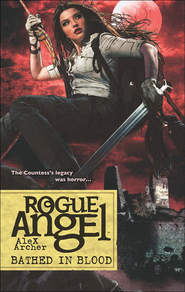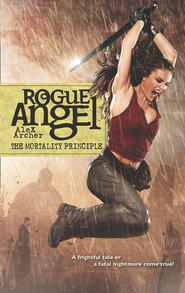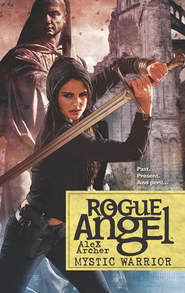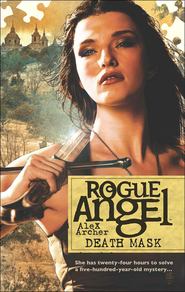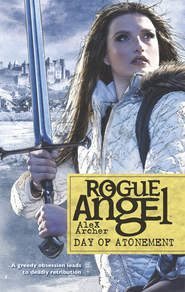По всем вопросам обращайтесь на: info@litportal.ru
(©) 2003-2025.
✖
The Golden Elephant
Автор
Год написания книги
2019
Настройки чтения
Размер шрифта
Высота строк
Поля
“Oh, dear, miss,” the man said in a lilting Jamaican accent. “Are you all right?”
She nodded and let them help her to her feet. She didn’t have much choice. She still didn’t have the muscular strength to stand on her own.
“I-I’m fine,” she said. “I get these spells. Epilepsy. Petit mal. Had it since childhood. Really, thank you, it’s passed now.”
The two exchanged a look. “We don’t want you suing us,” said the blond woman.
“No. I’m fine. Did you see which way my friend went?”
“No,” the man said. “She seemed very determined that we help you right away.” He shook his head. “She was quite the little package. It was too bad we had to rush away—”
“Oi!” the woman exclaimed. “That’s so sexist! I’ve half a mind to report you for that.”
“Now, now,” he said, “don’t go flying off here like—”
“Like what? Were you going to make another demanding sexist statement, then?”
“Don’t you mean demeaning? ” the male guard said.
Annja set off at what she hoped was a steady-looking pace, up the stairs to the next level. She made it through the door before she wobbled and had to lean back against it for a moment to gather herself.
The Korean exhibit was nearly empty. It was totally empty of any rogue archaeologist Zulu princesses. Annja drew a deep abdominal breath. It steadied her stomach and cleared her brain. Her vision expanded slowly but steadily. She no longer felt as if she were passing through a tunnel toward a white light.
She managed to walk briskly, with barely a wobble, through a door into a wider hall. Another set of stairs led down. Annja set her jaw.
The stairs descended to the ground level, and then to the north exit. She found herself outside on broad steps with Montague Place in front of her and the colonnaded pseudoclassical facade of the White Wing behind. It was called that not because it was white, but because it was named after the benefactor whose bequest made it possible to build.
The cool air seemed to envelop her. She sucked in a deep breath. The moist draft was so refreshing she scarcely noticed the heavy diesel tang.
A light rain began to tickle Annja’s face. She grunted, stamping one foot. Passersby glanced at her, then walked quickly on.
Calm down! she told herself savagely. This doesn’t always happen. She’s got the better of you twice. That’s not statistically significant.
She walked on as fast as she dared. She didn’t want some kind of behavior-monitoring software routine on the video surveillance to decide she was acting suspiciously. But she wanted to get away from the museum.
For a time she walked at random, lost in thoughts that whirled amid the noise of the city center. She stopped at a little café inside a glass front of some looming office building for a cup of hot tea.
Sitting on an uncomfortable metal chair, she gulped it as quickly as she could without scalding her lips. Outside she was surprised to see that twilight was well along. Gloom just coalesced atom by atom out of the gray that pervaded the cold heart of the city.
Setting the cup down, she strode out into the early autumn evening. The rain had abated. She headed toward Sir Sidney’s, a dozen or so blocks away. Maybe he’d turned something up.
I T ALWAYS AMAZED A NNJA how many little alcoves and culs-de-sac, surprisingly quiet even in the evening rush, could be stumbled upon in downtown London. Sir Sidney lived on a little half-block street, narrow and lined with trees whose leaves had already turned gray-brown and dead. It was so tiny and insignificant, barely more than a posh alley, it didn’t seem to rate its own spy cameras.
Trotting up the steps to the door of Sir Sidney’s redbrick flat, Annja wondered how his aging knees held up to them. Before she could carry the thought any further, she noticed the white door with the shiny brass knob stood slightly ajar.
She stopped in midstep. Her body seemed to lose twenty quick degrees. Foreboding numbness crept into her cheeks and belly.
“It’s all right,” she said softly. “He’s old. He might be getting absentminded. Just nipped out and forgot to fully close the door—”
Trying not to act like a burglar, she went on up the steps. She knocked quickly. “Sir Sidney?” she called. She was trying to make herself heard if he was within earshot inside without drawing attention to herself from outside.
She did not want to be seen.
Putting a hand in the pocket of her windbreaker, she pushed the door open and stepped quickly inside.
The entrance hallway was dark. As was the sitting room to her right. Nonetheless, the last gloom of day through the door and filtering in through curtained windows showed her the shape of Sir Sidney lying on his back on the floor.
The rich burgundy of the throw rug on which he had fallen had been overtaken by a deeper, spreading stain.
5
Annja knelt briefly at the old man’s side. The skin of his neck was cold. She felt no pulse.
She almost felt relief. If he was still alive with half his head battered in like that—
She shook her head and straightened. She would rather die than persist in such a state. She hoped Sir Sidney had felt the same way.
One way or another, he felt nothing now.
Moving as if through a fog that anesthetized her extremities and emotions, Annja took stock of the sitting room. The gloom was as thick as the cloying combination smell of old age, potpourri and recent death. She didn’t want to turn on a light, though. She wanted to draw no attention to her presence, nor leave any more signs of her presence than she had to.
Than I already have, she thought glumly. Irrationally if unsurprisingly, she regretted the earlier carelessness with which she had handled her teacup and saucer, the careless abandon with which she had handled the objects on display. Could I have left any more fingerprints?
The floor was scattered with toppled furniture. Strewed papers mingled with artifacts. Sir Sidney had welcomed his murderer—or murderers. There was no sign of forced entry. But he had not died easily.
Not far from the body lay a two-foot-high brass statue of Shakyamuni. The screen behind the seated figure was bent. The heavy metal object was smeared with blood. Annja looked away. She had seen too much death in her short life.
An overturned swivel chair drew her attention to the rolltop writing desk. Briskly she moved to it. She had little time. She racked her brain trying to remember if there had been anybody in the short, tree-lined lane who might have seen her enter the flat. Then again, anyone, driven by nosiness, caution or simple boredom, might have been peering out through the curtains to watch a long-legged young woman approach the apartment.
On the desk an old-fashioned spiral-bound notebook lay open. Annja almost smiled. She would have been surprised if the old scholar had kept his notes on a computer. But to her chagrin the first page was blank. Frowning, she started to move on.
Then she turned back and leaned close to study the page in the poor and failing light. With quick precision she tore the page away, folded it neatly and stuck it in her pocket.
She paused by the body. She made herself look down and see what Sir Sidney had suffered. It had been because of her, she knew—the laws of coincidence could be tortured only so far.
“I’m sorry, Sir Sidney,” she said in a husky voice. “I will find whoever did this.”
Already a deep anger had begun to burn toward Easy Ngwenya. Could her presence in the museum that afternoon possibly have been coincidence?
“And I will punish them,” Annja promised. It wasn’t a politically correct thing to say, she knew. Even to a freshly murdered corpse.
But then, there was nothing politically correct about wielding a martyred saint’s sword, either.
She quickly left the flat.
W HEN SHE WAS BACK in her hotel room the sorrow overtook her—suddenly but hardly unexpectedly. She didn’t try to fight it. She knew she must grieve. Otherwise it would distract her; unresolved, it might create a tremor of intent that could prove lethal.
She wept bitterly for a kind and helpful old man she had barely known. And for her own role in bringing death upon his head.






